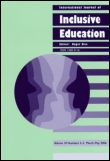
International Journal of Inclusive Education
Scope & Guideline
Bridging gaps in education through rigorous research.
Introduction
Aims and Scopes
- Inclusive Education Practices:
The journal explores various strategies and methodologies for implementing inclusive education in mainstream and specialized settings, examining teacher practices, curricular adaptations, and classroom management techniques. - Equity and Social Justice:
Research published in the journal addresses the critical issues of equity and social justice in education, focusing on the experiences of marginalized groups, including students with disabilities, refugees, and ethnic minorities. - Teacher and Stakeholder Perspectives:
The journal values the insights of educators, parents, and policymakers, investigating their perceptions, attitudes, and experiences related to inclusive education and the challenges they face in its implementation. - Cultural and Contextual Factors:
It emphasizes the influence of cultural, social, and economic contexts on inclusive education, promoting research that highlights local practices and adaptations necessary for effective inclusion. - Innovative and Collaborative Approaches:
The journal encourages innovative research methodologies and collaborative approaches among stakeholders, emphasizing the importance of partnerships in fostering inclusive educational environments.
Trending and Emerging
- Digital and Remote Learning:
With the rise of technology and the impact of the COVID-19 pandemic, there is a growing body of research on digital and remote learning strategies that enhance inclusion, particularly for students with disabilities. - Intersectionality in Inclusion:
The journal is increasingly addressing intersectionality, examining how overlapping identities such as race, gender, and socioeconomic status affect students' experiences in inclusive settings. - Community and Parental Engagement:
Research focusing on the role of families and communities in supporting inclusive education has gained prominence, highlighting the importance of collaborative practices in fostering student success. - Trauma-Informed Practices:
There is an emerging interest in trauma-informed approaches to inclusive education, recognizing the significance of understanding students' emotional and psychological needs in creating supportive learning environments. - Global Perspectives on Inclusion:
The journal is expanding its scope to include diverse global perspectives on inclusive education, showcasing practices and policies from various cultural and geographical contexts to enrich the discourse.
Declining or Waning
- Traditional Special Education Models:
There is a noticeable decrease in research focused solely on traditional special education models, suggesting a shift towards more integrated and inclusive practices that prioritize collaboration over segregation. - General Education Teacher Training:
The emphasis on training general education teachers specifically for inclusion appears to be waning, possibly due to a growing acknowledgment that inclusive practices should be an integral part of all teacher education programs rather than a separate focus. - Single Disability Focus:
The journal has seen less emphasis on studies that focus exclusively on one type of disability, indicating a trend towards broader, more inclusive approaches that consider the intersectionality of various needs and backgrounds. - Policy Analysis in Isolation:
Research that solely analyzes inclusive education policies without considering their practical implementation and impact in real classroom settings seems to be declining, reflecting a preference for studies that bridge theory and practice. - Quantitative Research Methods:
There has been a decline in the prevalence of purely quantitative studies, suggesting a shift towards qualitative, mixed-methods, and participatory research that captures the nuanced experiences of stakeholders in inclusive education.
Similar Journals
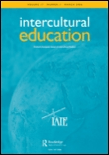
Intercultural Education
Connecting Cultures Through Transformative EducationIntercultural Education is a premier journal published by Routledge Journals, Taylor & Francis Ltd, dedicated to exploring the dynamic interplay between education and cultural diversity. With its ISSN 1467-5986 and E-ISSN 1469-8439, the journal has affirmed its significant presence in the academic landscape with an impressive Q1 ranking in Cultural Studies and Q2 in Education as of 2023. Its broad scope encompasses a variety of topics related to intercultural exchange, educational practices, and sustainable pedagogical models that support diverse learning environments. Enabling discussion among researchers, educators, and practitioners, Intercultural Education serves as a vital resource for understanding and effectively managing the complexities of multicultural education. With its consistent release from 2010 to 2024, this journal not only contributes to the academic dialogue but also reflects current trends and challenges in intercultural education, thus appealing to anyone invested in this critical field.

Luz
Advancing Knowledge, Empowering VoicesLuz is a distinguished academic journal published by CONCIENCIA PUBLICATIONS since 2011, dedicated to advancing knowledge in the fields of social sciences and humanities. With the ISSN 1814-151X and E-ISSN 1814-151X, this Open Access journal ensures unrestricted dissemination of research, enriching the global academic community. Hailing from Holguín, Cuba, it serves as a critical platform for researchers, professionals, and students to share innovative ideas and breakthroughs. Luz aims to foster interdisciplinary dialogue, provide insightful analyses, and promote collaborative research efforts, thus playing an essential role in shaping the scholarly narrative in its fields of focus. The journal's commitment to rigorous peer review and high-quality publications reinforces its significance and credibility, making it a valuable resource for those engaged in serious academic inquiry.

Rural Special Education Quarterly
Advancing Equity: Insights for Rural Special Education PractitionersRural Special Education Quarterly, published by SAGE Publications Inc, is an esteemed journal that focuses on the nuanced challenges and best practices in special education within rural contexts. With an ISSN of 8756-8705 and an E-ISSN of 2168-8605, this journal serves as a vital resource for researchers, educators, and policymakers interested in the intersection of rurality and special education. Spanning from 2015 to 2024, it boasts impressive rankings, holding a Q2 status in both Development and Education categories, attesting to its influence and credibility within the academic community. Apart from being rigorously peer-reviewed, Rural Special Education Quarterly aims to disseminate innovative research, offer a platform for diverse voices, and present practical insights that are crucial for enhancing educational equity in rural settings. Though it operates under a traditional access model, the journal’s commitment to fostering dialogue and advancing scholarship makes it indispensable for those dedicated to improving special education practices in the United States and beyond.
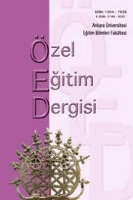
Ankara Universitesi Egitim Bilimleri Fakultesi Ozel Egitim Dergisi-Ankara University Faculty of Educational Sciences Journal of Special Education
Cultivating a community of special education advocates.Ankara Universitesi Egitim Bilimleri Fakultesi Ozel Egitim Dergisi (Ankara University Faculty of Educational Sciences Journal of Special Education) is a premier, peer-reviewed journal dedicated to the dissemination of high-quality research in the field of special education. Published by ANKARA UNIV, FAC EDUCATIONAL SCIENCES and made available as an Open Access publication since 2015, this journal caters to a global audience of researchers, educators, and practitioners committed to advancing the knowledge and practices in special education. With an ISSN of 1304-7639 and an E-ISSN of 2149-8261, the journal aims to foster impactful discussions and collaborations in educational sciences, focusing on innovative methodologies, inclusive practices, and effective interventions. Its commitment to open access ensures that vital research is accessible to all, thus enhancing the educational landscape. By prioritizing rigorous scholarly contributions, the journal plays a key role in shaping the future of special education in Turkey and beyond.
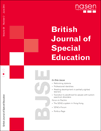
British Journal of Special Education
Elevating Standards in Special Education ResearchThe British Journal of Special Education, published by WILEY, serves as a pivotal resource in the fields of educational psychology and special education. With an impactful legacy dating back to 1974 and progressing through to 2024, this journal presents rigorously peer-reviewed articles that address current challenges, innovations, and research findings pertaining to special education practices in the United Kingdom and beyond. Although it does not operate under an Open Access model, its subscription-based access ensures that each publication reaches a dedicated audience of researchers, educators, and professionals committed to enhancing educational outcomes for individuals with special needs. Ranked in the third quartile in both developmental and educational psychology and education categories by Scopus in 2023, the journal plays a crucial role in advancing the dialogue on inclusive educational practices. Articles published in this journal attract diverse contributions, promoting interdisciplinary approaches essential for understanding and addressing the complexities of special education.

International Journal of Multicultural Education
Empowering educators through culturally responsive research.The International Journal of Multicultural Education (IJME), published by EASTERN COLL, DEPT EDUCATION, is a leading open-access journal dedicated to advancing the field of multicultural education. Established in 2007, this journal has become an essential platform for researchers, educators, and policymakers interested in exploring the complexities of education in diverse cultural contexts. With an impressive impact factor and strong rankings in multiple categories including Q1 in Anthropology and Cultural Studies, and Q2 in both Education and Social Sciences, the IJME provides high-quality, peer-reviewed articles that contribute to impactful educational practices and scholarship. The journal's open access model ensures that its invaluable research reaches a global audience, fostering dialogue and collaboration among academics, practitioners, and students. By focusing on themes that address social justice, equity, and cultural awareness in education, the IJME plays a critical role in shaping inclusive and effective educational frameworks for the future.

Journal of Research in Special Educational Needs
Empowering Diverse Learners Through ResearchJournal of Research in Special Educational Needs, published by WILEY, serves as a vital resource for scholars and practitioners within the field of special education. This esteemed journal, with an ISSN of 1471-3802 and E-ISSN of 1471-3802, is recognized for its contribution to advancing our understanding of the educational needs of diverse learners. With a commendable impact factor and a current ranking of Q2 in Education, it showcases high-quality, peer-reviewed research that emphasizes evidence-based practices, innovative strategies, and policy implications relevant to special educational needs. The journal has been converging valuable insights since 2007 and is indexed within Scopus, with a notable position in the 64th percentile of Social Sciences - Education. The journal's commitment to inclusivity and accessibility makes it an essential platform for researchers, professionals, and students looking to enhance their knowledge and practice in this important field.

Australasian Journal of Special and Inclusive Education
Advancing Equity in Education for All LearnersThe Australasian Journal of Special and Inclusive Education, published by Cambridge University Press, is a premier academic outlet dedicated to advancing research and practice in the fields of special and inclusive education. With an ISSN of 2515-0731 and an E-ISSN of 2515-074X, this journal provides a crucial forum for scholars, educators, and practitioners who are committed to promoting accessibility and equity in educational settings. As of 2023, it holds a Q3 ranking in the Education category among Scopus indexed journals, highlighting its contribution to scholarly discourse, as it ranks #919 out of 1543 journals. With a strong emphasis on empirical research and theoretical exploration, this journal aims to bridge gaps between policy and practice, making it an essential resource for those seeking to enhance the learning experiences of diverse student populations. Although currently not an open-access journal, the Australasian Journal of Special and Inclusive Education remains a significant player in the education landscape, facilitating the dissemination of quality research and fostering collaboration among researchers, educators, and policymakers.

Metodicki Ogledi-Methodical Review
Cultivating Scholarly Discourse Across DisciplinesMetodicki Ogledi-Methodical Review is a distinguished academic journal published by the Croatian Philosophical Society, specializing in the fields of Education and Philosophy. With an ISSN of 0353-765X and an E-ISSN of 1848-2325, the journal serves as a vital platform for scholarly discourse and research dissemination from Croatia and beyond. Although currently positioned in the Q4 category in Education and Q3 in Philosophy, Metodicki Ogledi plays a crucial role in fostering interdisciplinary dialogue, combining pedagogical insights with philosophical inquiries. It has achieved a Scopus rank of #341 out of 806 in Philosophy and #1306 out of 1543 in Education, highlighting its relevance in the academic community. The journal's ongoing commitment to publishing quality research from 2017 to 2024 ensures it remains a significant resource for researchers, educators, and students seeking to enhance their understanding of methodical practices within these fields. While the journal currently does not offer open access options, its curated articles are pivotal for advancing knowledge in educational methodologies and philosophical thought.
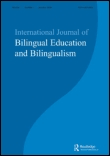
International Journal of Bilingual Education and Bilingualism
Illuminating the path to effective language acquisition.The International Journal of Bilingual Education and Bilingualism is a premier publication dedicated to advancing the field of bilingual education and language acquisition. Published by Routledge Journals, Taylor & Francis Ltd, this UK-based journal features a robust collection of research articles, reviews, and theoretical discussions, making it essential reading for educators, linguists, and policymakers. With an impressive impact factor that underscores its influence, it holds top quartile rankings in both Education and Linguistics and Language categories for 2023, reflecting its high-quality content and academic rigor. The journal covers pivotal topics from bilingual teaching methodologies to the cognitive implications of multilingualism, catering to the needs of a diverse and global audience. Its Scopus ranks further emphasize its esteemed position within the academic community, ranking 18th in Language and Linguistics and 21st in Social Sciences’ Linguistics. By providing insights into contemporary challenges and innovations in bilingual education, the International Journal of Bilingual Education and Bilingualism continues to be a vital resource for researchers, professionals, and students alike, inspiring new directions in bilingual education research.